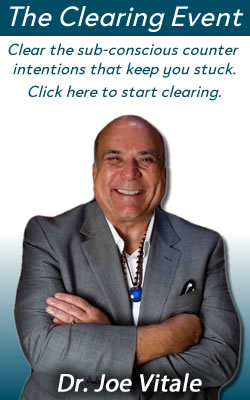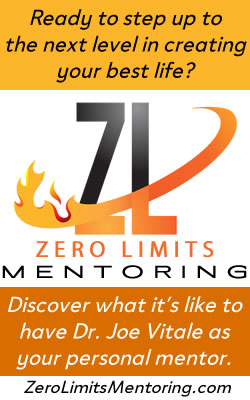Joe Vitale
How do you manifest correctly?
Someone just wrote me an interesting question…
I’ve just finished reading The Attractor Factor, and enjoyed its easy style and simple instructions for manifesting your desires. Having read your five step process, I then got confused by the inclusion of the intentional meditation. My confusion is this:
There’s a contradiction between deciding, picturing and letting go, versus, stating what you want and picturing it repeatedly. Which is right? Are they both right, in different ways?
I’ve browsed through some articles on your website www.mrfire.com and found this quote from Joe Sugarman – “You don’t want to dwell on what you’ve just let go or keep visualizing it or even keep thinking about it. Why?… because it interferes with the perfection of the Universe to manifest exactly what you want to accomplish”.
Other writers have said the same thing, as I’m sure you know repeatedly asking for something just reinforces the lack of it. Yet, self-hypnosis techniques emphasize the repeated visualization of a desired goal.
Now, you are both a hypnotherapist and an adept manifestor. May I ask what you do, what works for you? And any other thoughts you might have on the matter?
With best regards, and sincere appreciation of what you are doing for people.
Good question.
What’s the answer?
As I explain in the book, The Attractor Factor, you can have whatever you want as long as you don’t want it.
Huh?
What that means is this: You can have whatever you want as long as you don’t need it.
The idea is to be non-attached to it. If you need something to manifest, you are actually sending out an energy of desperation. Well, desperation just leads to more desperation. Need just leads to more need.
You want to be in the spirit of letting go — which is the fifth step in The Attractor Factor process. You can visualize and focus and repeatedly say you want something, and the process will work as long as you are detached from the outcome of it.
This is an advanced concept in the art of manifestation, so don’t let it make you too dizzy.
If you want to explore all of this in depth, consider getting the four-week course described at www.AttractANewCar.com
Be happy,
Joe
How to Attract Abundance
Carol Look is an EFT (Emotional Freedom Technique) practictioner who interviewed me on her radio show yesterday about how to attract abundance.
We covered the five steps in my book The Attractor Factor and had a fun time. Carol added a lot of juicy stuff and pulled some good stories out of me.
But I think the interview really got interesting when someone called in right at the end with two questions. Carol was concerned about time and asked me to answer one question. I was on a roll and devoured both questions.
One question was about how do you attract a car when you don’t care about cars, and the other was about how do you deal with a negative person in your life who just won’t go away?
The good news is you can hear the call online, or download it and listen wherever you like, all at no charge, by going to http://www.CarolLook.com/voiceamerica
Note: EFT is a “tapping” method for releasing blocks through a type of psychological acupuncture. Carol didn’t explain EFT in our interview but she has a wonderful book on the subject called Attracting Abundance With EFT. Get it at Amazon or from her site www.CarolLook.com
Enjoy.
joe
How to sell at higher prices
I just finished reading a great book that you absolutely must have. It’s called – How to Sell at Margins Higher Than Your Competitors: Winning Every Sale at Full Price, Rate or Fee.
To show you the power of this, consider…
If two lemonade stands are side by side, what can one of them say on their sign to grab all the business?
The answer is in the book.
Or consider…
When people tell you they shop based on price, what are they actually saying?
The answer is in the book.
The book is a revised edition of an underground classic you may have heard of by Dr. Lawrence Steinmetz, called “Selling at Prices Higher Than Your Competitors.” This time around though, he’s teamed up withbestselling co-author, Bill Brooks, a leading expert on sales.
As the title implies, it’s all about finalizing deals – without cutting price – but it went way beyond my expectations. These two authors answer everything you always wanted to know about price. And it’s clearly written with easy to understand examples.
It applies to every aspect of selling, marketing, buying – I just can’t recommend it enough.
But here’s a better deal…
These authors are determined to get the book on top of the bestseller list and they’re offering a great bonus package. I’ve looked at all the material and I urge you take advantage of this great offer— today.
Ironically, the book isn’t selling for a high price. You can get it — and the bonuses — for under $50. Here’s the link where you can review the goods:
http://www.1shoppingcart.com/app/?Clk=1211064
Thought: If you don’t go look at the site, why not?
In this age of intense competition, we all need to know how to sell at higher prices — even me.
That’s why I love this book.
Go for it.
Joe
My Executive Mentoring Program
My Executive Mentoring Program has become very popular. While expensive, the training people get is beyond question. It is taking them to new levels of success, where ideas become reality and potential becomes profit.
Still, some folks want more.
A few people in the mentoring program want me and my staff to give them access to my books, or software, or me.
Well, let’s look at that.
Think back for a second:
When a college student pays their tuition, do they also get their books and other materials for free?
I think not.
When someone signs up for my mentoring program, what they are paying for is mentoring.
If they want my books, or my Nightingale-Conant audio program (The Power of Outrageous Marketing) http://www.Nightingale.com, or my writing software, they should pay for them, just like anyone else.
I think people need to be clear about what they are buying. Investing in mentoring is wise. It’s one of the secrets of success. I say do it. You’ll find an application and more details at
http://www.joe-vitale-executive-mentoring.com/info.html
You’ll no doubt get a freebie or two when you register, but don’t expect access to all my works, or my software, or me. Again, you’re investing in mentoring, not my product line. For that, go see http://www.HypnoticMarketingStrategy.com
Go for it.
joe
Video Blogs: The next big trend?
I’m a late bloomer when it comes to blogs but Nerissa, my love, sure isn’t. She’s had a video blog online for me for months now. She keeps putting up short clips of me doing the oddest things. See them at http://drjoevitale.blogspot.com/
Nerissa also sees that video on blogs is the next big trend. Her recent newsletter describes how some blogs are editing news video to support their perspectives. Pretty wild. In many ways, that’s all the media does anyway. See her thoughts on video blogs at http://www.thevideoqueen.com/newsletter2_7.html
Joe


